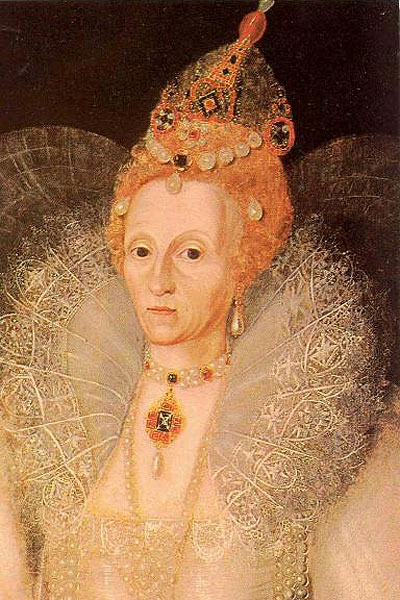Queen Elizabeth I's Report Card
Jump to navigation
Jump to search
 Elizabeth I ruled England from 1558 - 1603 (45 years) Here we analyse "the good, the bad and the ugly " of this time period. You be the Judge |
| Assessment: |
| KEY ACHIEVEMENTS: The England she inherited was described by one of her own agents as "a bone between two dogs" - France and Spain. Few believed then that she (a mere woman, with a disputed claim) could hold the throne without tying the country to some greater power. Instead, after 45 years of solo rule, she left a realm sure of its place in the world, with the confidence only half a century of stability could give. One that had seen the expansion of its interests, the securing of its borders, and the regularisation of its currency, as well as the great flowering of the Renaissance. PERSONAL QUALITIES: Brave, resourceful, charismatic, clever and extraordinarily cultured; a musician, linguist and poet. A terrible youth (her mother executed on her father's orders; her own life threatened by her sister) unexpectedly bred in her a kind of humanity. She was instinctively merciful; and reluctant, until forced to it, to involve England in the wars of other countries. She counted the greatest triumph of her reign to have ruled with her people's love; and though she could be vain, she was never vain enough to put her own wishes, her own dynasty, above the needs of her country. GLOBAL IMPACT: The adventures of exploration and trade that later gave Great Britain its prosperity began in Elizabeth's reign, as did the cultural achievements (Shakespeare) on which our reputation in the world still partially depends. She made England a major player in Europe - indeed her support for the Netherlands Protestants, and the Armada victory, made possible a Protestant Northern Europe. Promising to preserve her people from "oppression and wrong", Elizabeth was a ruler whose own refusal "to open windows into men's souls" paved the way for the religious settlement, and the secular state, that we still know today - a model that has since been followed by other countries. LEGACY: Without Elizabeth we would not be who we are today - children of a proud (and a Protestant) nation. The Virgin Queen (our first true patriot, after medieval monarchs who treated England as a piece of personal property) is a vital part of our national mythology. Women, from Queen Victoria to Margaret Thatcher, owe her a particular debt. It's hard now to realise quite how unnatural her female rule at first seemed to her contemporaries. Before Elizabeth, no woman had ever successfully reigned over the country. After her, no-one could ever again relegate women to the sidelines so easily. [Source: Sarah Gristwood is author of Elizabeth and Leicester. <a class="external" href="http://news.bbc.co.uk/1/hi/magazine/6936537.stm#graphic" rel="nofollow" target="_blank" title="BBC News Magazine">BBC News Magazine</a> After leaving Oxford, she worked as a journalist specializing in the arts and women's issues, and as a broadcaster. Arbella, her historical biography of Arbella Stuart, was widely acclaimed. <a class="external" href="http://news.bbc.co.uk/1/hi/magazine/6936537.stm" rel="nofollow" target="_blank" title="Alison Weir - BBC News Magazine]"> </a> |
| The Good | The Bad | The Ugly |
| Princess Elizabeth Tudor | ||
What do you think? Put your comments here: |